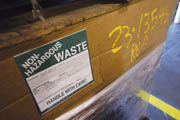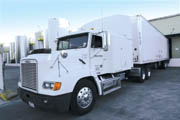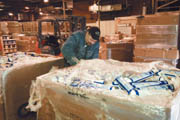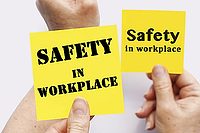
Quick. What's an environmental, health and safety manager's worst nightmare? Or, come to think of it, what's the worst nightmare of any plant manager, president, or shareholder in an industrial company?
"Nobody wants to be part of a Superfund site," says Marshall Seavers, plant manager of W.W. Henry's Arlington, TX, manufacturing facility. "Our mission as a company is not only to introduce new, high-performance products, help our customers grow and, hopefully, make money, but also to minimize our risk in the process."
Sixty-year-old W.W. Henry began as a manufacturer of roofing coatings, mastics and highway sealants, and has evolved - through various company and ownership changes - into the industry leader in flooring adhesives and installation products. Its merchandise is available at big-box retailers as well as through wholesale distribution. It has an enviable market position, which supports three plants and hundreds of employees.
Financial liability issues, however, are never far from anyone's mind. They may not drive the business like sales or marketing, but they can certainly put the brakes on a fast-moving organization.
"Like any adhesives manufacturer, we have to worry about the waste streams we generate, setting up the proper paperwork with the state, transport issues such as compliance with new DOT security standards and, of course, confirming the permit status of waste-management facilities," says Seavers.
For many years, W.W. Henry's strategy was to let each of its plants - located in Bourbonnais, IL, Dallas, GA, and Arlington, TX - manage internal processes such as paperwork and labels, and outsource transport and waste disposal to a local service provider. The service providers, it was later determined, were not well founded or well funded. They tended to be owners of landfills or incinerators with a vested interest in managing waste in a certain way. Certifying and supervising treatment sites was difficult. Issues of environmental responsibility and moving up the regulatory hierarchy to recycling and beneficial reuse were hardly ever discussed.
In late 1996, the company pushed for a review of resources with the goal of standardizing procedures. W.W. Henry looked at several regional environmental services providers as well as two national suppliers. The final decision was influenced by three factors: size/stability, capabilities and additional levels of service offered.
Size was important because W.W. Henry wanted someone who could handle all three plants and was financially strong. "From a risk-management perspective, having a company that's large and well-funded has its advantages," says Seavers. "They're not going to take any shortcuts when they take custody of our waste at the dock door, and they're going to audit all recommended waste-management facilities on a regular basis to protect themselves from liability. Ultimately, that protects us."
Standard capabilities such as expertise in registering waste streams, familiarity with regulatory requirements and processes, competence in preparing the paperwork and container labels, the ability to safely transport wastes and the like are, obviously, mandatory for a provider.
But, Seavers adds, the ability to properly profile and offer advice on handling each type of waste in the best way is something not everyone offers. For W.W. Henry, commitment to regulatory compliance is only the first step. The company also wants to be environmentally responsible. Therefore, an established profiling process was of particular interest.

"They're part of a large, financially strong, Fortune 500 company. They have decades of experience as a chemical company managing their own waste streams. And they can provide solutions across the entire spectrum of our waste-management needs," says Seavers.
The partnership is fairly simple.
W.W. Henry produces water- and solventborne adhesives for all types of flooring from vinyl to wood to carpet. No byproducts are generated during the manufacturing process, but off-spec adhesives that can't be reworked back into other adhesives must be managed.
Ashland schedules pick-ups every other month. First, a local Ashland facility e-mails its respective W.W. Henry plant to ascertain the type and amount of waste the facility has. If a new waste stream needs to be registered, Ashland prepares the paperwork for the state ahead of time upon collection of the appropriate information and completion of sampling, if necessary. (Ashland also performs regular audits to identify any discrepancies in the paper trail.) Manifests and labels are provided in advance of Ashland's arrival. A DOT-certified Ashland driver picks up the waste and transports it to the appropriate treatment, storage, disposal or recycling site. The objective is to minimize the energy expenditure required by W.W. Henry employees.

Ashland also provides continuous training on new regulatory issues such as DOT security compliance, new regulatory interpretations by federal and state agencies, and timely customer service and technical support. But in the end, it is the financial liability issue that drives Seavers' outsourcing decision.
"Having an environmental services company that surpasses my company in size and financial resources is like a security blanket," he says. "Ashland's experience and expertise is assurance that I shouldn't get into trouble with waste-management issues, and that helps me sleep a little more soundly at night."
For more information on Ashland environmental services, call 800-637-7922 or visit www.ashdist.com. For more information on W.W. Henry, visit www.wwhenry.com.


